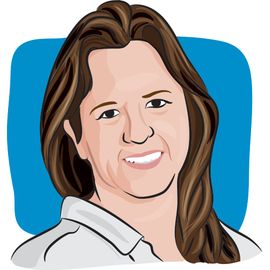- About Us
- Advertise / Support
- Editorial Board
- Contact Us
- CancerNetwork.com
- TargetedOnc.com
- OncLive.com
- OncNursingNews.com
- Terms & Conditions
- Privacy
- Do Not Sell My Information
- Washington My Health My Data
© 2025 MJH Life Sciences™ and CURE - Oncology & Cancer News for Patients & Caregivers. All rights reserved.
I Can’t Jump on the Bandwagon of CBD for Cancer Care

Tamera Anderson-Hanna is a Licensed Mental Health Counselor, Certified Addiction Professional, Certified Rehabilitation Counselor and became a Registered Yoga Teacher while coping with breast cancer in 2015. She owns Wellness, Therapy, & Yoga in Florida where she provides personal wellness services and coaching and she is a public speaker on wellness-related topics. You can connect with her at www.wellnesstherapyyoga.com.
I am not allowed to use CBD products, so when my oncology team recommended I try them, it gave me pause.
CBD seems to be all the hype these days, but is there more to be considered than simply jumping on the bandwagon and using it?
I had to make a choice a couple of years ago as to how to manage the pain and discomfort associated with cancer procedures. For me, CBD is not an option, making me think, “What are options for individuals such as me who can’t use CBD and are cautious about the lack of regulations and purity?”
I might have a different view about CBD because not only am I a cancer survivor, but also a certified addiction professional and mental health provider. My experience over the years has led me to manage my own care and that of my clients with a more natural approach, which includes using caution about what we put into our body.
Most substances can have negative side effects, and some can additionally lead to dependence or addiction. I personally prefer to use meditation, exercise and a balance of healthy foods to help with wellness and pain management. I have to admit, however, I have not used CBD. You see, CBD is not regulated by the FDA, and I am not allowed to use CBD because of my employment status.
My physician suggested I use CBD, but this would have gotten me fired from my job. Little do some individuals appear to know is that many forms of CBD are going unregulated in terms of the amount of THC that is present —that is why I cannot use it. If my doctor prescribed CBDand I took it without asking questions, I could have been terminated from my job.
That is not the only reason I have not chosen to use CBD.However, my question for my physician was this: what is the plan for the length of time you would want me to use CBD and what alternative pain management resources are you referring me to?
In my situation, no other resources were recommended. Is the message becoming similar to the message that a pill is all you need?
While there can be some benefit to CBD, it brought to my attention that some physicians might be recommending CBD but no other resources and supports for individuals to learn to help manage their emotional and physical well-being. I ask myself: Can this eventually lead to an addiction or over reliance on CBD?
I mentioned I use meditation, exercise and a healthy diet, but I also partake in acupuncture and practice techniques for maintaining a sense of gratitude and positive self-talk. In other words, I have an internal sense of control, which is supportive in avoiding addiction rather than feeling I am dependent on a substance, product or activity. I attempt to find multiple ways to make time for wellness and can create some of this from my own ability to manage my choices with options.
My caution to individuals considering CBD is to find a physician who can properly monitor use and offer a plan for helping to develop additional coping skills so that CBD does not become a crutch. Remember, other complementary supports such as acupuncture, aqua therapy, yoga, physical therapy, counseling, and stress, pain, or anxiety management can be taught as lifelong skills in addition to CBD use.
I also hope that healthcare providers who are recommending CBD for cancer survivors use caution and understand that there are some individuals — like myself — who are not allowed to use these products.
For more news on cancer updates, research and education, don’t forget to subscribe to CURE®’s newsletters here.
Related Content:



